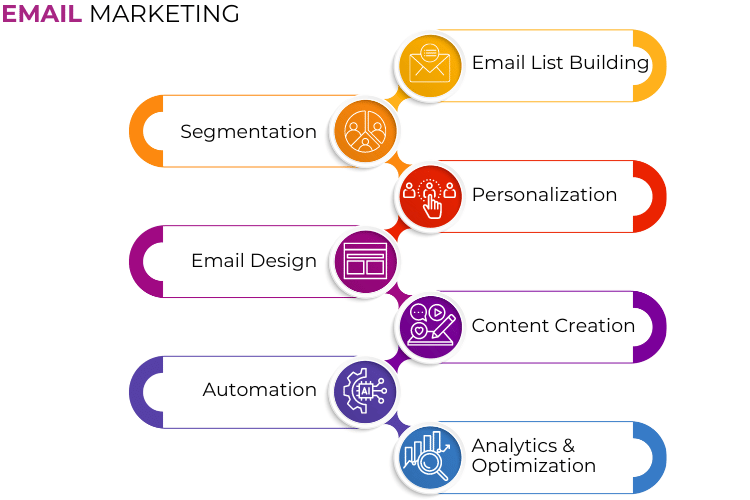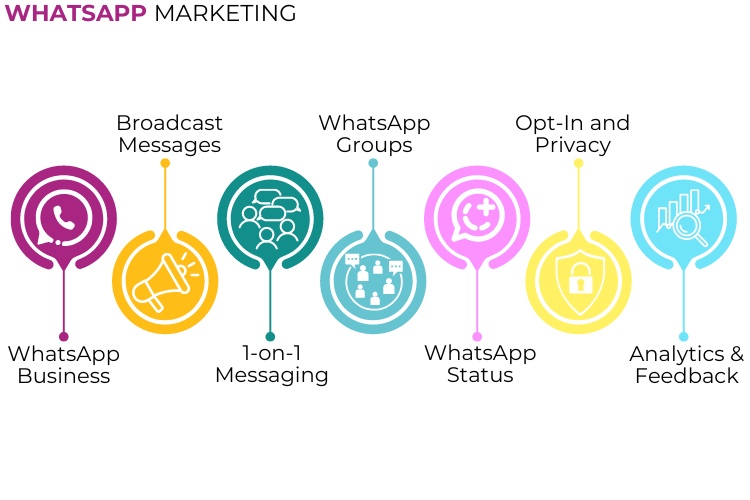Bulk Mail / MSGS
Email and WhatsApp marketing are two powerful digital marketing strategies used by businesses to engage with their audiences, promote products or services, and drive conversions. Here's an overview of each:
Email Marketing:
Email marketing involves sending commercial messages to a group of people via email. It's a highly effective and cost-efficient way to nurture leads, build relationships with customers, and drive sales. Key components of email marketing include:
- Email List Building: Building a permission-based email list by capturing email addresses through website sign-up forms, lead magnets, and other opt-in methods.
- Segmentation: Segmenting the email list based on demographics, interests, purchase history, or other criteria to send targeted and relevant messages to different audience segments.
- Personalization: Personalizing email content with recipients' names, preferences, and past interactions to increase engagement and relevance.
- Email Design: Designing visually appealing and mobile-responsive email templates that align with brand identity and messaging.
- Content Creation: Creating valuable and engaging content such as promotional offers, product updates, newsletters, and educational resources to keep subscribers informed and engaged.
- Automation: Setting up automated email campaigns triggered by specific actions or events, such as welcome emails, abandoned cart reminders, or re-engagement campaigns.
- Analytics and Optimization: Tracking key metrics such as open rates, click-through rates, conversion rates, and unsubscribe rates to measure the effectiveness of email campaigns and optimize performance over time.

WhatsApp Marketing:
WhatsApp marketing involves using the WhatsApp messaging platform to communicate with customers, deliver marketing messages, and provide customer support. It's a direct and personal way to reach audiences and can be particularly effective for businesses targeting mobile users. Key components of WhatsApp marketing include:
- WhatsApp Business: Using the WhatsApp Business app or WhatsApp Business API to create a business profile, automate messages, and manage customer interactions more efficiently.
- Broadcast Messages: Sending broadcast messages to multiple recipients simultaneously to share promotional offers, announcements, or updates.
- 1-on-1 Messaging: Engaging in one-on-one conversations with customers to provide personalized assistance, answer questions, and address concerns in real-time.
- WhatsApp Groups: Creating WhatsApp groups for customer communities, special interest groups, or loyalty programs to foster engagement and interaction among members.
- WhatsApp Status: Sharing updates, stories, or behind-the-scenes content on WhatsApp Status to keep followers informed and engaged.
- Opt-In and Privacy: Respecting users' privacy and obtaining consent before sending marketing messages via WhatsApp to comply with regulations and build trust with customers.
- Analytics and Feedback: Monitoring message delivery, open rates, and response rates to evaluate the performance of WhatsApp marketing campaigns and gather feedback from customers.

In summary, email and WhatsApp marketing are both valuable channels for businesses to connect with their audiences, deliver targeted messages, and drive engagement and conversions. By incorporating these strategies into their marketing mix, businesses can effectively reach customers wherever they are and build stronger relationships over time.
